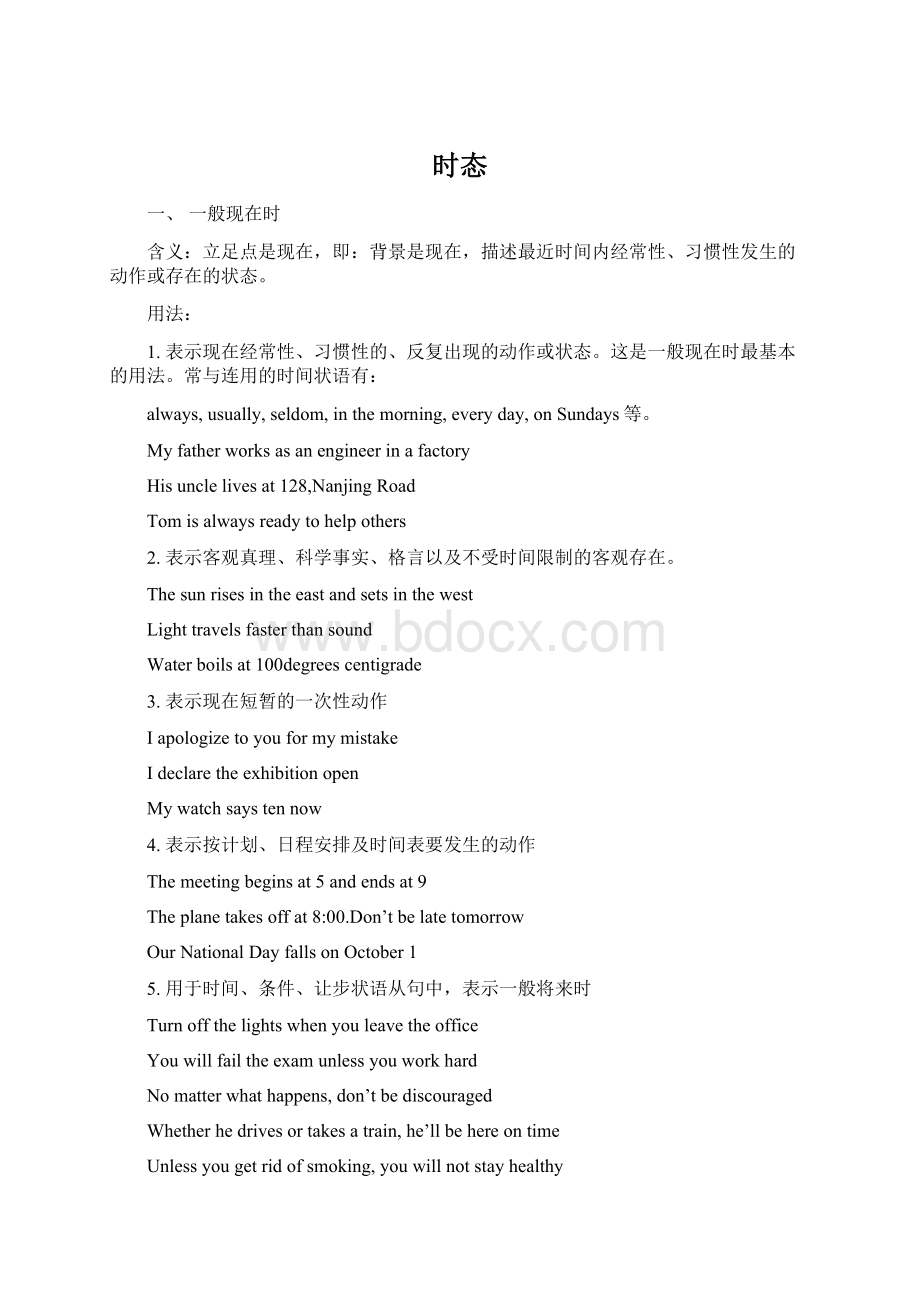时态Word下载.docx
《时态Word下载.docx》由会员分享,可在线阅读,更多相关《时态Word下载.docx(15页珍藏版)》请在冰豆网上搜索。

Youwillfailtheexamunlessyouworkhard
Nomatterwhathappens,don’tbediscouraged
Whetherhedrivesortakesatrain,he’llbehereontime
Unlessyougetridofsmoking,youwillnotstayhealthy
Whenyoucomenexttime,I’llshowyouaroundourcampus
6.在下列句子中相当于进行时
Therecomesthebus
Theregoesthebell
Herehecomes
7.在seetoit/makesure/makecertain+that从句中用一般现在时表示将来
Makesurethatyoupickmeupat5
I’llseetoitthatIreturnthereferencebookontime
二、一般过去时
背景是现在,描述过去发生的动作或存在的状态。
标志性词有:
yesterday,lastweek,…ago,in2008,inOctober,justnow,inthepast,theotherday,when引导的时间状语从句等
1.表示过去经常性、习惯性的、反复出现的动作或状态。
这是一般过去时最基本的用法。
IstudiedhardwhenIwasatschool
Luxunwrotemanybooks
Hewasalwaysreadytohelpothers
2.表示过去短暂的一次性动作。
常与之连用的状语yesterday,lastweek,afewyearsago,justnow,after+时段等
Yesterdayweorganizedanouting
LastSundaywevisitedtheGreatWall
3.用于时间、条件状语从句中表示过去将来
Thecoachsaidthetrainingwouldbeputoffifitrained
Myneighboraskedmetolookafterherchilduntilshereturned
4.动作即使刚刚发生也要用过去时
Whatdidyousay?
Oh,it’syou.Ididn’texpecttoseeyouhere
Iamsorry,butIdidn’tknowyouweresobusy
Yourtelephonenumberagain.Ididn’tquitecatchit
It’ssoclose.Ataxiwasnotatallnecessary
5.句型:
would(had)rathersbdid宁愿某人做某事
It’shigh/about/propertimethatsbdidsth早该。
。
了
6.usedtodo/woulddo过去常常
Weusedtobeclosefriends.Butnowwehavelosttouchwitheachother
Theywouldcometoourhelpwhenwewereintrouble
三、现在进行时
以现在为背景,表示说话时正在进行的动作或存在的状态。
1.表示现在说话时正在进行的动作
Thetelephoneisringing.Wouldyoupleaseanswerit?
Theyarewaitingforus.Let’shurryup!
Listen!
Itisrainingoutside.
2.表示现阶段正在进行的动作,说话时不一定正在进行
Itissaidthatheistranslatingabook
Weareconsideringbuildinganotherbridge
Idon’treallyworkhere.Iamjusthelpingout
3.表示最近按计划、安排将要进行的动作。
但并不是所有的动词都可以这么用。
常见的能这样用的动词有:
gocomeleavestartarrivestayreturnmeettake等等。
这时往往有一个表示将来的时间状语
WeareleavingonFriday
Whenareyoustartingoff?
IamgoingtotheStatesandIamtakingmyparents
4.有时可以表示“暂时、临时的动作或状态”
Thisisnotmyraincoat.Mineishangingbehindthedoor
----Whatistheresult?
----Timeisnotup.Butourteamisnowleading.我们的队暂时领先
5.与always,forever,constantly等连用,表示感情色彩,如喜好厌恶等
Sheisforevercomplainingaboutherjob
Youareconstantlyfindingfaultwithme
Sheisalwayscaringaboutherclothes
Asateacher,sheisalwaysthinkingofherstudents
6.一般来说,只有延续性动词才可用于进行时态,但有些非延续性动词如:
die,stop,start,finish等,用于进行时态可以表示一个“马上就要、即将。
”的动作。
课翻译成“快要。
”
Waitaminute.Iamfinishingmybook
Look!
Theirteamislosing/winningthegame
Theoldmanisdying
Iamcomingtothatquestion
Thesunissetting
7.下列句子中的介词短语也可以表示正在进行的动作
Whatareyouafter?
Don’tdisturbme;
Iamatwork
Itisreportedthattheworkersareonstrike
MyTVsetisunderrepair
四、过去进行时
含义:
以过去为背景,表示那时正在进行的动作或存在的状态。
常用的时间有:
thismorning,thewholeafternoon,from9to10lastevening,when,while等
1.表示过去某一时刻正在进行的动作
Whatwereyoudoingat9lastnight?
Whenhecamein,Iwashavingmysupper
---Look!
Whereareyougoing?
---Sorry!
Iwasn’tnoticing
2.表示过去某一段时间正在进行的动作,说话的那一刻动作不一定正在进行
Atthattime,myhusbandwasservinginthearmy
Hetoldusthathewasconsideringgoingabroad
Theysaidtheyweresavingmoneytobuyahouse
3.和现在进行时一样,有些动词的过去进行时可表示过去按计划、安排将要进行的动作。
但并不是使所有的动词都可以这么用。
IheardthathewasleavingonFriday
Thenewbossisarrivingtoday?
Ithoughthewasarrivingtomorrow
4.和现在进行时一样,过去进行时也可以与always,forever,constantly等连用,表示感情色彩,如喜好厌恶等
Theboywasconstantlymakingtrouble
Shewasalwaysworkinglikethatwhenshewasyoung
Hewasalwaysthinkingofothers
5.有时候要从上下文当中体会,要用过去进行时
Wherehaveyoubeen?
Wewerelookingforyou.
Isawyouatthemeetingbutyouweretalkingtoagirl
6.下列句子中的介词短语也可以表示正在进行的动作
OurpresidentwasonavisittoanAsiancountrythen
Theexpresswaywasunderconstructionthen
注:
进行时表示说话时或现阶段的动作,因此进行时具有暂时性、持续性和未完成性
Mycousiniswritinganovel.Iwonderwhenhewillfinishit.
WhenIleft,shewaswashingherclothes.Ithinksheisthroughwiththemnow
进行时态不可与表示一段时间的状语连用,完成进行时可与一段时间的状语连用
Ihavebeenwaitingforanhour,buthehasn’tturnedup
Whenwearrived,ithadbeenrainingfor4days.
五、一般将来时
含义:
背景为现在,描述将来要发生的动作或存在的状态。
表示从现在的角度看将要发生的动作或存在的状态。
一般说来shall用于第一人称,will用于其他人称。
常与之连用的时间状语有:
tomorrow,nextweek/month,soon,in+一段时间等
Weshallgraduateinafewmonths
Whenshallwehavetheinterview?
Hewillbe50yearsoldnextyear
将来时的其他用法:
1.begoingtodo表示
A)按计划、安排、打算要做的事。
这种打算往往经事先考虑,甚至已做了某种准备
Whereareyougoingtospendyourholidaythissummer?
Iamgoingtojointhearmyaftergraduation
B)从迹象上看要…
Lookatthecloudsinthesky.Itisgoingtorain.
Ifeelterrible.IamafraidIamgoingtobeill.
2.beabouttodo
Silenceplease,silence!
Themeetingisabouttobegin
Wewereabouttoleavewhenweheardacryforhelp
3.betodo
A)按计划、安排要做某事
Wearetomeetatthegateat2:
00pm.Tomorrow
WhenamItogetintouchwithhim?
B)表示“禁止、命令”,相当于mustn’t,haveto
Youarenotgooutwithoutpermission
Youaretohandinthematerialsbefore5
C)表示“注定要…”
Allthesethingsaretobeansweredfor.所有这一切都注定要偿还
Atthattime,nobodywouldexpectthebeggarwastobeanemperor.当时没有人会料到那个乞丐会当皇帝
4.某些动词如:
go,come,leave,start,arrive,stay,return,take等的进行时可以表示将来
Howareyougoingthere,byboatorbytrain?
Whoareyoustayingwith?
5.在时间和条件状语从句中用一般现在时表示一般将来时
Don’twaitforhim.Itwillbelongbeforeheisback
Weshallgounlessitrains.
6.时刻表上或日程安排上定好了的事情
Theplanetakesoffat10
Themeetingstartsat5o’clock
1.will表示未经事先考虑,说话时临时决定做某事
1)---Thereisaknockonthedoor
---Oh,Iwillgotoanswerit
2)---Sorry,Iforgettoposttheletterforyou
---Itdoesn’tmatter.Iwilldoitmyself
2.will表示必然性
IftodayisMonday,tomorrowwillbeTuesday
Mybrotherisseventeennow;
hewillbeeighteennextyear
六、过去将来时
立足点是过去
即:
背景为过去,描述将来要发生的动作或存在的状态。
表示从过去的角度看将要发生的动作或存在的状态。
多用于宾语从句中。
Theyweresuretheirteamwouldwinthefinal
Wedidn’texpectthatsuchalittlegirlwouldsucceed
Hesaidthathewouldcomebackthenextday
和一般将来时一样,过去将来时也可通过其他方式表示
Were/wasgoingtodo,were/wastodo,were/wasabouttodo/过去进行时(动词多为go,come,leave,arrive等)
Nooneknewwhentheyweregoingtoannouncetheresultstous
Thetouristssaidtheyweretosetoffforthenextplaceofinterestthenextday
Thechairmanaskedthepeoplepresenttobesilence;
themeetingwasabouttobegin
IwonderwhentheywereleavingforBeijing
were/wasgoingtodo表示“过去打算但未实现的愿望”,可译为“原打算……”
Iwasgoingtostaywithyoutoday,butnowIhavetoleaveatonce
七、现在完成时
背景是现在,描述过去发生某事,当即就结束(短暂性动作),但动作后果影响到现在;
或过去发生某事,动作持续到现在结束(持续性动词)。
现在完成时的时间状语:
for…,since,sofar,ever,never,just,yet,till/until,uptonow,inthepast/lastyears,always,recently等皆不确定的时间状语。
主动结构:
sb.Have/hasdonesth
被动结构:
sth.Have/hasbeendone(bysb.)
1.动作本身发生在过去而不是现在,但对现在造成了影响或有了结果,其结果或影响往往是隐性的。
常与之连用的副词already,yet,ever,never,before等。
Hehaslefthiskeyathisoffice
Ihaveneverseenthisfilmbefore
GreatchangeshavetakenplaceinChina
2.动作开始于过去,持续到现在,也许还要持续下去。
经常与之连用的时间状语有:
for+一段时间、since+时间点、today,thesedays,thismorning,sofar,recently,(eversince),lately,in/for/over/duringthepast/last+时间段等
Shehastaughtinthisschoolsincegraduation
SofarIhavenotfoundanymistakeinhiswork
Howlonghaveyouworkedinthecompany?
3.现在完成时也可以用于时间、条件状语从句中,表示将来完成的动作(即从句的动作先完成,主句的动作后完成)
Don’tgetoffthebusuntilithasstopped.强调车完全停下
IwillgiveyoumyopinionwhenIhavereadthebookthrough
(强调将书读完)
Ifyouhaven’tfinisheditbefore5,youhavetooverwork(加班)
注:
1.havebeento表示去过某地,现在已回来
havegoneto表示已去某地,可能在去的路上,或已在某地或返程中
Ourmanagerisnotin.HehasgonetoXi’an
IhavebeentoBeijingseveraltimes
---WhereshallIsayyouhavegoneifLiPingasksaboutyou?
---JustsaythatIhavegonetoBeijingonbusiness
2.有几个习惯句型要记住:
Itis5yearssinceIjoinedthearmyin1980
Itis3yearssinceIgotmarried
Itoldthemitwas5yearssinceIhadenjoyedagooddrink
我告诉他们我五年没有痛痛快快喝酒了
This/that/itisthethirdtimeyouhavemadethesamemistake
This/that/itwasthefirsttimewehadmet
3.since引导的时间状语从句。
如谓语动词是延续性的一般过去
时,意为“从这个动作结束以来”;
如谓语动词是非延续性的
一般过去时,意为“从这个动作开始以来”
1)Itis3yearssincesheworkedasajournalist
我不当记者3年了
TenyearshaspassedsincewelivedinBeijing
我们已十年不在北京住了
2)Itis5yearssinceIjoinedthearmy
我在部队已服役5年了
Twentyyearshasgonebysincewegotmarried
我们已结婚20年了
4.since后面一般跟一个时间点,如果跟一个时间段,后面要加ago
Ihaveknownhimsince1987
Ihaveknownhimsince30yearsago
5.非延续性动词也可用于完成时态,只是它们不可和since和for短语连用
Hehasgoneabroad
HehasstayedintheUSAfor5years/since5yearsago
6.“for+一段时间”不总与完成时态连用。
只要是延续性动词,都可以与“for+一段时间”连用